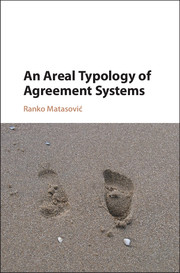Book contents
- An Areal Typology of Agreement Systems
- An Areal Typology of Agreement Systems
- Copyright page
- Contents
- Figures
- Maps
- Tables
- Preface
- Abbreviations
- Part I Theoretical Prerequisites
- Part II Empirical Results
- 7 The Sample of Languages
- 8 Areal and Genetic Patterns in Agreement Systems
- 9 Typological Correlations in Agreement Systems
- 10 Diachronic Patterns in the Development of Agreement
- 11 Conclusions
- Appendix: Languages in the Database
- References
- Language Index
- Subject Index
10 - Diachronic Patterns in the Development of Agreement
from Part II - Empirical Results
Published online by Cambridge University Press: 16 May 2018
- An Areal Typology of Agreement Systems
- An Areal Typology of Agreement Systems
- Copyright page
- Contents
- Figures
- Maps
- Tables
- Preface
- Abbreviations
- Part I Theoretical Prerequisites
- Part II Empirical Results
- 7 The Sample of Languages
- 8 Areal and Genetic Patterns in Agreement Systems
- 9 Typological Correlations in Agreement Systems
- 10 Diachronic Patterns in the Development of Agreement
- 11 Conclusions
- Appendix: Languages in the Database
- References
- Language Index
- Subject Index
Summary
- Type
- Chapter
- Information
- An Areal Typology of Agreement Systems , pp. 136 - 152Publisher: Cambridge University PressPrint publication year: 2018



